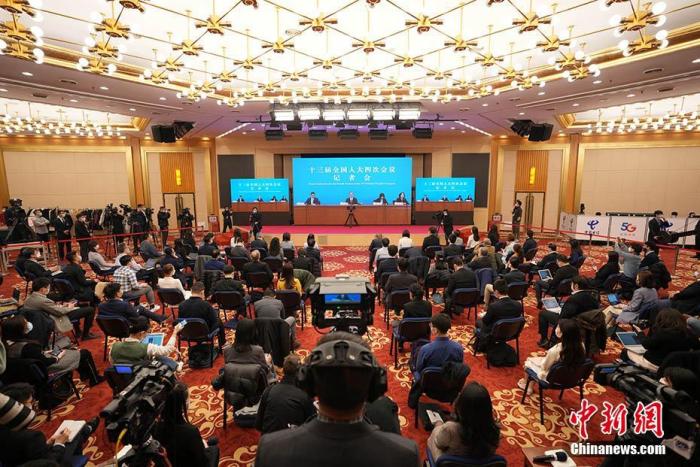(Observation of the NPC and CPPCC) It has never changed due to time and events. Why does China choose multilateralism firmly?
China News Service, Beijing, March 9 (Huang Yuqin and Li Jingze) The situation of the century when the epidemic was superimposed over a hundred years, whether it is anti-epidemic cooperation or post-epidemic economic recovery, whether it is global governance or regional development, a series of complex international issues remain to be solved.
"In the face of endless problems and challenges in the world, the solution lies in that all countries adhere to true multilateralism." The statement made by Chinese State Councilor and Foreign Minister Wang Yi during the National Two Sessions shows that China has always anchored the solution to global problems. Set above the maintenance and practice of multilateralism.
"Multilateralism has always been a firm choice for China, and it has never changed due to time or events." At the same time, Wang Yi once again conveyed China's adherence to multilateralism to the outside world.
How to understand multilateralism in China's eyes may be more clearly perceived by the outside world from a set of numbers.
Data map: On March 7, the Fourth Session of the 13th National People's Congress held a press conference in the Great Hall of the People in Beijing. Chinese State Councilor and Foreign Minister Wang Yi answered questions from Chinese and foreign journalists on "China's foreign policy and foreign relations."
In order to effectively prevent and control the epidemic and jointly maintain public health and health, the press conference will be conducted in the form of online video.
The picture shows a reporter interviewing in the multifunctional hall of Media Center.
Photo by China News Agency reporter Jiang Qiming
"50, 20"
For the relationship between China and multilateralism, 2021 is undoubtedly a special year.
This year is not only the 50th anniversary of New China's restoration of its legal seat in the United Nations, but also the 20th anniversary of China's accession to the WTO.
In this context, the relationship between China and multilateralism is more historical.
Some commentators pointed out that China’s development has benefited from multilateral cooperation, and it should also become a firm defender of multilateralism. The special timing provides a new opportunity for China to practice multilateralism with practical actions.
"For decades, China has been integrating into the international system and establishing closer ties with the international community. China has benefited from the development of multilateral mechanisms, and these mechanisms have also become more complete and representative due to China's participation." China International Issues Ruan Zongze, the executive vice president of the Academy, pointed out in an interview with a reporter from China News Agency that the benign interaction between China and the United Nations, WTO and other multilateral mechanisms has made each other and injected more certainty into a world full of uncertainties.
Cui Hongjian, director of the European Institute of the China Institute of International Studies, told reporters that the background of "50 years" and "20 years" is of special significance to China's relationship with multilateralism.
Practicing the realistic requirements of multilateralism with practical actions has provided China with more opportunities. China has the opportunity to participate more actively in UN affairs, promote WTO reform, facilitate the fair distribution of new crown vaccines, and maintain the stability of the global industrial chain supply chain with the new development pattern .
"4"
At the time when the situation has changed over a century and the epidemic situation has been superimposed by the century, the economic recession, ideological prejudice and a series of global challenges have pushed the future of multilateralism to the crossroads of the world.
In fact, similar key decisions in history are not far away.
Four years ago, when globalization encountered a counter-current and unilateralism and protectionism were on the rise, globalization's "controversy over survival and abolishment" rose for a while.
At that time, China pointed out the development direction of economic globalization and expressed its firm position of adhering to multilateralism to promote economic globalization.
Today, China still chooses to stick to multilateralism and is committed to promoting the process of international cooperation.
Observers believe that in recent years, global challenges have continuously tested the way countries solve problems. At a turning point in the evolution of the international landscape, China has taken multilateralism as a solution and played an important role in participating in global governance.
Su Xiaohui, deputy director of the U.S. Institute of the China Institute of International Studies, told reporters that from the "globalization dispute" four years ago to the current "what is the future of multilateralism", China is striving to find a way to cope with global challenges. Possible solution path.
"0"
When multilateralism has gradually become the consensus of the international community, the "pseudo multilateralism" characterized by a zero-sum game is even more confusing now.
Some analysts pointed out that the core of "pseudo multilateralism" is zero-sum confrontation, not inclusive cooperation.
In the face of global challenges, countries in the world can only truly achieve win-win cooperation if they step out of the small circle of zero-sum game.
"Pseudo multilateralism" is not only deceptive but also harmful.
Ruan Zongze cited the distribution of the new crown vaccine as an example, saying that "pseudo multilateralism" prioritizes its own country, which in turn causes vaccine nationalism or drags down the global anti-epidemic process.
Wang Yi pointed out the characteristics of "pseudo multilateralism" sharply. "Small circle multilateralism" is still group politics. "National priority multilateralism" or unilateral thinking. "Selective multilateralism" is not the right choice. .
"Adhering to true multilateralism requires a deeper understanding of multilateralism. It is not an expedient measure, but a long-term strategy." Cui Hongjian pointed out, "Multilateralism is a banner, not a cover; it is belief, not rhetoric." Such expressions are in sharp contrast with pseudo-multilateralism, reflecting China's deep understanding of multilateralism.
(Finish)

